What's New - October 2011
| CALCE Prediction of Potential Failures Risks in Toyota Vehicles Confirmed by NASA Scientists |
Investigations of Toyota vehicles have revealed tin whiskers in a critical component of their vehicle engine control system. At the 5th International Symposium on Tin Whiskers, Henning Leidecker and his team at NASA's Goddard Space Flight Center, who are recognized experts on electronic device failure and tin whiskers, presented their studies of tin whiskers on Toyota electronics. They determined that the risk of failure due to tin whisker shorting in affected Toyota vehicles can be on the order of 50 to 150 per million. This figure agrees with the number reported in a recently published scientific journal article written by CALCE researchers Bhanu Sood, Michael Osterman, and Michael Pecht. In this study, the probability of a tin whisker induced electrical short was estimated to be 140 per 1 million, based on whisker growth statistics.
Tin whiskers are known to grow from tin-finished surfaces and have been associated with costly failures of electronic systems. Linking tin whiskers to electronic product failure is often extremely difficult. Tin whiskers that bridge across terminations can create electrically resistive pathways. And since whiskers shift under an electrostatic field and can melt when the electrical current is drawn, they may cause intermittent electrical failures.
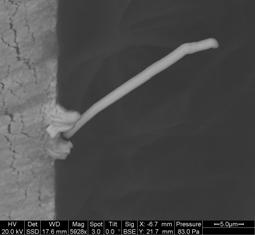 |
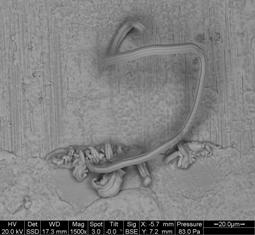 |
Figure 1 Tin whiskers on the edge of an acceleration position sensor board connection terminal in a 2002 Toyota Camry. |
Considering the number of vehicles on the road, the presence of tin whiskers in engine control components presents a significant safety hazard. For this reason, best practices for electronics design stipulate that tin not be used as a plating material. It is very questionable why the National Highway Traffic Safety Administration with its stated mission to "save lives, prevent injuries and reduce economic costs due to road traffic crashes, through education, research, safety standards, and enforcement activity" has not come out with a requirement that no electronics associated with control of automobiles use pure tin as a material component, since the potential for tin whiskers presents an unreasonable and unnecessary risk.
To learn more about this study, please click here. For more information related to tin whiskers, contact Michael Osterman at osterman@calce.umd.edu. If you found this article interesting, check out more on CALCE's tin whisker research, here.
|
| Forecasting Electronic Part Procurement Lifetimes |
CALCE has published a paper on its research into Diminishing Manufacturing Sources and Materials Shortages (DMSMS) obsolescence, which is defined as the loss of the ability to procure a technology or part from its original manufacturer. The ability to forecast when technologies and specific parts will become unavailable (non-procurable) is a key enabler for pro-active DMSMS management and strategic life cycle planning for long field life systems. CALCE has proposed a methodology for predicting the obsolescence dates for electronic parts that do not have clear evolutionary parametric drivers. The method is based on the calculation of procurement lifetime using databases of previous obsolescence events and parts that have not gone obsolete. The methodology has been demonstrated on a variety of electronic parts and it has been used in trending of specific part attributes. Click here to read more or contact Professor Peter Sandborn at sandborn@calce.umd.edu.
If you found this article interesting, check out more on CALCE's research on obsolescence management, here. Also, check out CALCE's professional development courses on prognostics and health management.
|
| Influence of Molding Compounds on Leakage Current in MOS Transistors |
Leakage current in a MOS transistor can contribute to heat dissipation, resulting in higher power consumption, and precipitate failure mechanisms such as latch-up and oxide breakdown. CALCE investigators have published a paper containing a case study that demonstrates various experimental techniques for identifying the mechanism of an increase in leakage current. The experimental techniques presented in the paper can be used to evaluate the propensity of a molding compound to cause an increased leakage current. Since passivation layer damage can be caused by improper selection and processing of molding compounds, the contributions of the passivation layer toward leakage current are also discussed. Recommendations are presented for molding compound and MOS transistor manufacturers regarding the selection and evaluation of molding compounds using a design-of-experiments approach. Click here for more or contact Dr. Diganta Das at digudas@calce.umd.edu.
If you found this article interesting, check out more on CALCE's research on failure analysis, here. Also, check out CALCE's professional development courses on failure analysis.
|
| CALCE Presents Short Course on Counterfeit Part Risks, Detection at IMAPS 2011 |
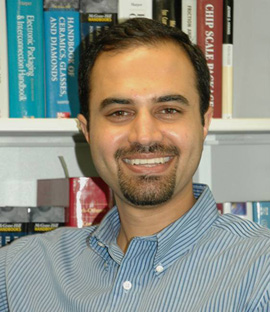 |
|
Bhanu Sood |
|
CALCE Failure Analysis Laboratory Director Bhanu Sood will lead a half-day professional development course (PDC) at IMAPS 2011 where he will provide an overview of the electronic parts supply chain, potential drivers for counterfeit parts, and the sources and the extent of the counterfeit electronics problem. A large section of the course will be devoted to the tools and techniques that can be used to positively identify suspected counterfeit parts. The PDC will be held from 1-5 p.m. on Sunday, October 9, 2011, at IMAPS 2011 in Long Beach, CA. For more information please click here or contact the course instructor, Bhanu Sood, at bpsood@calce.umd.edu or by phone at 301-405-3498.
|
| Conference on Risk Assessment and Evaluation of Predictions - October 12-14 |
CALCE is pleased to announce The Conference on Risk Assessment and Evaluation of Prediction, which will be held on October 12-14, 2011 at the Crowne Plaza Hotel in Silver Spring, MD. The conference is organized by the Biostatistics and Risk Assessment Center of the Department of Epidemiology and Biostatistics at the University of Maryland and will address reliability and survival analysis methods through a series of presentations by experts from academia and industry. Two half-day tutorials will also be offered to all the registered participants at no additional cost. Click here to view the tentative program for this conference. Click here to register. For more information, contact Dr. Diganta Das at digudas@calce.umd.edu. |
| Dr. Das to Lead IPC Webinars on Free Air Cooling (Oct. 18) and LED Reliability (Nov. 9) |
| |
 |
| |
Dr. Diganta Das |
Dr. Diganta Das will lead two webinars in the coming months as part of the IPC 2011 Fall Semester Webinar Series for Professional Development.
On October 18, Dr. Das will discuss the Impact of Free Air Cooling on the Reliability of Information and Communication Technology Equipment. The Webinar will cover the methods used to implement free air cooling, the ambient operating environment under free air cooling, and the possible reliability risks arising out of free air cooling. This Webinar is of value for the infrastructure operators considering the use of fresh air cooling and for those designing and manufacturing equipment for use in such infrastructures.
On November 9, Dr. Das will provide an introduction to Light Emitting Diode (LED) Reliability and Testing. This Webinar will review the latest progress in understanding of failure mechanisms of LEDs that occur at the die, the interconnect, and at the package level including electrostatic discharge, delamination, and phosphor thermal quenching. The driving factors for precipitating these mechanisms will be discussed to help the developers and users of LEDs to control the mechanisms. The Webinar will also touch upon the qualification methods that will be most suitable to meet future needs of diverse applications. For more information, please click here or contact Dr. Das at digudas@calce.umd.edu.
|
| CALCE LED Reliability Tutorial - October 24 |
CALCE will hold a half-day tutorial on light emitting diode (LED) reliability on October 24, 2011. Dr. Diganta Das and CALCE PhD candidate Moon Hwan-Chang will review the latest progress in understanding of failure mechanisms in LEDs that occur at the die, interconnect, and packaging levels. The driving factors precipitating these mechanisms will be discussed to help developers and LED users to control identified failure mechanisms and assess LED reliability. The course will address qualification methods and opportunities to apply prognostics and health management (PHM) in LED qualifications and applications. Click here or contact Dr. Diganta Das at digudas@calce.umd.edu for more information.
|
| CALCE Showcases Rapid Reliability Assessment at SARA® Workshop - October 24 |
Dr. Michael Osterman will lead a one-day workshop on the center's one-of-a-kind physics-of-failure-based simulation assisted reliability assessment software, SARA®, on October 24, 2011. SARA® uses physics-of-failure principles to assess whether an electronic part or system can meet defined life-cycle requirements. SARA® is used to support the CALCE Design-for-Reliability (DfR) assessment process, which allows design engineers to rapidly make design changes and assess product reliability. The software can also be used to assess the life expectancy of electronic hardware under anticipated life-cycle loading and accelerated stress test conditions. Attendees will be provided with a six-month trial of the software. Cost for non-CALCE members is $750.00. For more information, click here or contact Dr. Osterman at osterman@calce.umd.edu. |
| Thermal Management Short Course - October 24 |
 |
|
Professor Michael Ohadi |
|
Professor Michael Ohadi will lead a one-day short course on next-generation thermal management of electronics, with a focus on energy efficiency, on October 24, 2011 at the University of Maryland. This short course will review the latest progress in thermal management and thermal management of electronics in particular. Energy efficiency, methods that may be most suitable to meet future needs of diverse applications, thermal management of 3-D electronics, and energy management in data centers will also be discussed. This cost of this short course is $250 USD for CALCE and CEEE Members, and $500 USD for non-Members. For more information, click here or contact Prof. Ohadi at ohadi@umd.edu. |
| CALCE EPSC and PHMC to Present Latest Research Findings - October 25-26 |
The CALCE Electronic Products and Systems Consortium (EPSC) will hold its Fall Technical Review and Project Planning Meetings from October 25-26, 2011, at the University of Maryland's College Park campus. CALCE investigators will provide year-end reports on FY11 projects and plan the schedule of projects for FY12. EPSC Projects presented at the meeting, will include: electrical aspects of tin whisker failures, degradation analysis of lithium ion batteries, high temperature solder system for improved reliability, multi-axial vibration test methods, and much more. In addition to the EPSC projects, the Prognostic and Health Management Consortium projects will be presented in a special section. This event is free for CALCE EPSC and PHMC members. Non-EPSC organizations interested in attending the technical review should contact Dr. Michael Osterman at osterman@calce.umd.edu.
For more information on CALCE EPSC, please visit: http://www.calce.umd.edu/consortium.html.
|
| CALCE to Present at the IPC Conference on Reliability - Nov. 1-2 |
Drs. Michael Osterman and Diganta Das will be presenters at the IPC Conference on Reliability: Assembly Process for a Reliable Product. Dr. Osterman will provide two presentations on "Assessing Electrical Failure Risk Induced By Tin Whiskers" and "Simulation Assisted Reliability Assessment". Dr. Das will also provide two presentations during the conference, "ESD Risks Under a Controlled Environment" and "Physics-Based Test Methods for Reliability Assessment". The IPC Conference on Reliability will be held at the Marriott Irvine in Irvine, CA from November 1-2, 2011. This unique event will take attendees through the assembly process from materials to test and inspection and provide them with the latest information to help increase assembly processes and product reliability. For more information, please click here or contact Dr. Osterman at osterman@calce.umd.edu.
|
| Three-Day Failure Analysis Course - Nov. 1-3 at Technical University of Denmark |
  CALCE and Buehler will hold a three-day short course on failure analysis of electronics from Nov. 1-3, 2011 at the Technical University of Denmark in Lyngby, Denmark. This intensive short course will offer lectures, demonstrations, and hands-on laboratory training in failure analysis methodology. For more information, click here or contact Bhanu Sood, at +1 (301) 405-3498 or by email at bpsood@calce.umd.edu, or Dr. Michael Azarian at mazarian@calce.umd.edu. CALCE and Buehler will hold a three-day short course on failure analysis of electronics from Nov. 1-3, 2011 at the Technical University of Denmark in Lyngby, Denmark. This intensive short course will offer lectures, demonstrations, and hands-on laboratory training in failure analysis methodology. For more information, click here or contact Bhanu Sood, at +1 (301) 405-3498 or by email at bpsood@calce.umd.edu, or Dr. Michael Azarian at mazarian@calce.umd.edu.
|
| Counterfeit Electronic Parts & Electronic Supply Chain Symposium - December 6-8 |
|
CALCE and SMTA are pleased to announce the west coast venue for the 2011 Symposium on Counterfeit Electronic Parts and Electronic Supply Chain. The symposium will be held December 6-8, 2011 at the Crowne Plaza Anaheim Resort in Garden Grove, CA. This event will address the impact of changes in the electronic parts supply chain and part selection and management processes. Don't miss this opportunity to exchange insights with government, industry and academic professionals who are addressing the counterfeit problem. Please click here for a look at one of CALCE's featured presentation for this symposium. For more information, please click here or contact Dr. Diganta Das at digudas@calce.umd.edu.
|
| Multi-Degree of Freedom (MDOF) Vibration Testing Research Highlighted |
CALCE presented its research on Multi-Degree of Freedom (MDOF) Vibration Testing on September 20, 2011. MDOF testing is at the forefront of vibration testing and is already used in a wide variety of industries including defense, aerospace, and automotive. Today, MIL STD 810 includes guidelines for MDOF testing. Attendees of the seminar learned about the results from the latest research in MDOF testing and received up-to-date information on the systems used to conduct these tests. For more information, please click here or contact Prof. Dasgupta at dasgupta@calce.umd.edu.
|
| Fifth International Tin Whisker Symposium Proceedings Now Available |
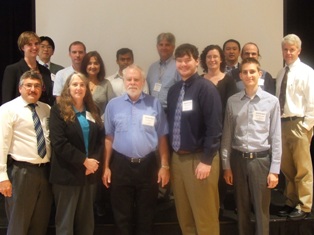 |
|
Presenters from the 5th International Symposium on Tin Whiskers |
|
|
CALCE saw a strong turnout at the Fifth International Symposium on Tin Whiskers, held from September 14-15, 2011 at the University of Maryland. The two-day symposium covered theories of tin whisker growth, risk evaluation methods, and risk mitigation strategies through presentations by representatives from Nippon Avionics, Robert Bosch, Sandia National Labs, NASA, NIST and many more. More than 70 attendees from over 30 organizations learned about the current state of knowledge and received guidance in developing effective qualification and mitigation procedures for their products. For more information, please click here or contact Dr. Michael Osterman at osterman@calce.umd.edu.
|
| Professor Pecht Visits KAIST |
| |
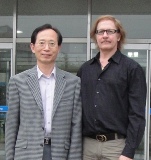 |
| |
Professor Soon-Bok Lee, KAIST, and Professor Michael Pecht, CALCE |
Professor Michael Pecht visited the Korea Advanced Institute of Science and Technology (KAIST) in Daejeon, South Korea, in July 2011, where he met with Prof. Soon-Bok Lee at the Computer Aided Reliability Evaluation (CARE) Laboratory to discuss KAIST and CALCE's recent work in electronics reliability. Prof. Lee, a visiting professor at CALCE from 1997-1998, is the founder and director of the CARE Laboratory at KAIST. Research at CARE, established in 1988 and named an authorized National Reliability Laboratory in 2001, is focused on enhancing reliability in transportation, communications, and energy generation systems. Established in 1971, KAIST is South Korea's most prestigious university specializing in science and engineering education and research. For more information on this presentation, please click here or contact Prof. Pecht at pecht@calce.umd.edu.
|
| Prof. Pecht Delivers Keynote Speech at the 10th ICEMI |
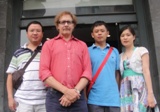 |
|
From left to right: Prof. Long Bin, Prof. Michael Pecht, Prof. Qiang Miao, and Dr. Lili Ma |
|
On August 16, 2011, Professor Michael Pecht delivered the keynote speech on the topic of "A New Approach to Qualification For the Electronics Industry" at the 10th International Conference on Electronic Measurement & Instruments (ICEMI) in Chengdu, China. ICEMI, the world's premier conference on electronic measurement and instruments, convenes every two years and is dedicated to the reviewing of electronic testing of devices, boards, and systems, covering the complete life cycle. During the conference, Prof. Pecht met with Prof. Houjun Wang, vice president of the University of Electronic Science and Technology of China (UESTC), to discuss collaborative research activities between CALCE and the UESTC. He also met with three former UESTC year-long visitors to CALCE: Prof. Long Bin, Prof. Qiang Miao, and Dr. Lili Ma. For more information, click here or contact Prof. Pecht at pecht@calce.umd.edu.
|
|
The Center for Advanced Life Cycle Engineering (CALCE), the largest electronic products and systems research center focused on electronics reliability, is dedicated to providing a knowledge and resource base to support the development of competitive electronic components, products, and systems.
Unsubscribe from this list.
Our mailing address is:
inform@calce.umd.edu
Our telephone:
Tel.: 301-405-5323
Fax: 301-314-9269
Copyright (C) 2011 CALCE. All rights reserved.
|
|






 CALCE and Buehler will hold a three-day short course on failure analysis of electronics from Nov. 1-3, 2011 at the Technical University of Denmark in Lyngby, Denmark. This intensive short course will offer lectures, demonstrations, and hands-on laboratory training in failure analysis methodology. For more information,
CALCE and Buehler will hold a three-day short course on failure analysis of electronics from Nov. 1-3, 2011 at the Technical University of Denmark in Lyngby, Denmark. This intensive short course will offer lectures, demonstrations, and hands-on laboratory training in failure analysis methodology. For more information, 

